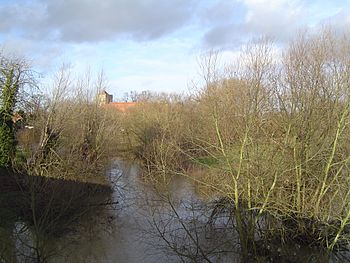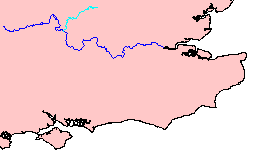River Thame facts for kids
Quick facts for kids Thame |
|
|---|---|

River Thame south of Dorchester (wider than usual because of flood waters)
|
|

Rivers Thame (cyan) and Thames (blue) in south-east England
|
|
| Country | England |
| Counties | Buckinghamshire, Oxfordshire |
| Towns | Aylesbury, Dorchester |
| Physical characteristics | |
| Main source | Vale of Aylesbury |
| River mouth | River Thames Dorchester |
| Length | 65 km (40 mi) |
The River Thame is a river located in Southern England. It is a smaller river that flows into the famous River Thames. The Thame flows mostly southwest. It travels about 40 mi (64 km) from its start to where it joins the Thames. This river begins in the county of Buckinghamshire and ends in Oxfordshire.
Contents
Journey of the River Thame
Where the River Begins
The River Thame starts from three small streams. These streams begin in a wide, flat area called the Vale of Aylesbury. This area is on the north side of the Chiltern Hills. The three streams meet together northeast of Aylesbury. Aylesbury is the main town in Buckinghamshire.
The Thame and the English Civil War
The River Thame played a part in the English Civil War. In 1642, a local leader named John Hampden defended Aylesbury. He led his Parliamentarian forces at the Battle of Holman's Bridge. This battle took place where a small road crosses the river.
Flowing Through Villages and Towns
The streams that form the Thame meet near a small area called Watermead. This place has a special curved lake, like an oxbow. The river then flows past farms near the villages of Nether Winchendon and Chearsley.
Next, the Thame reaches the market town of Thame. The town and the river share the same name. Thame is about 15 miles (24 km) east of Oxford. It grew from an old Anglo-Saxon settlement by the river. In early English history, Thame was an important religious site.
The River as a Defense Line
At Holton mill, the Thame quickly turns south. It passes the villages of Great Milton and Stadhampton. Here, the river valley becomes wider. In 1642 and 1643, the river helped protect Oxford for the Royalist army.
Bridges at Wheatley, Cuddesdon Mill, and Chiselhampton were very important crossing points. Chiselhampton Bridge was key for Prince Rupert's movements. This was before and after the Battle of Chalgrove Field.
Joining the River Thames
Meeting Point at Dorchester
Finally, the River Thame reaches the village of Dorchester on Thames, in Oxfordshire. The name "Dorchester" shows that a Romano-British settlement was once there. The main streets of the town are old Anglo-Saxon style. They are not perfectly straight.
Dorchester is home to Dorchester Abbey. This large church was built in 1170. It is 70 meters long and is a very old, important building.
The Confluence
About 0.5 miles (0.80 km) south of Dorchester, the Thame flows into the River Thames. This meeting point is between Day's Lock and Benson Lock. The upper part of the River Thames is sometimes called The Isis until it joins with the River Thame.

